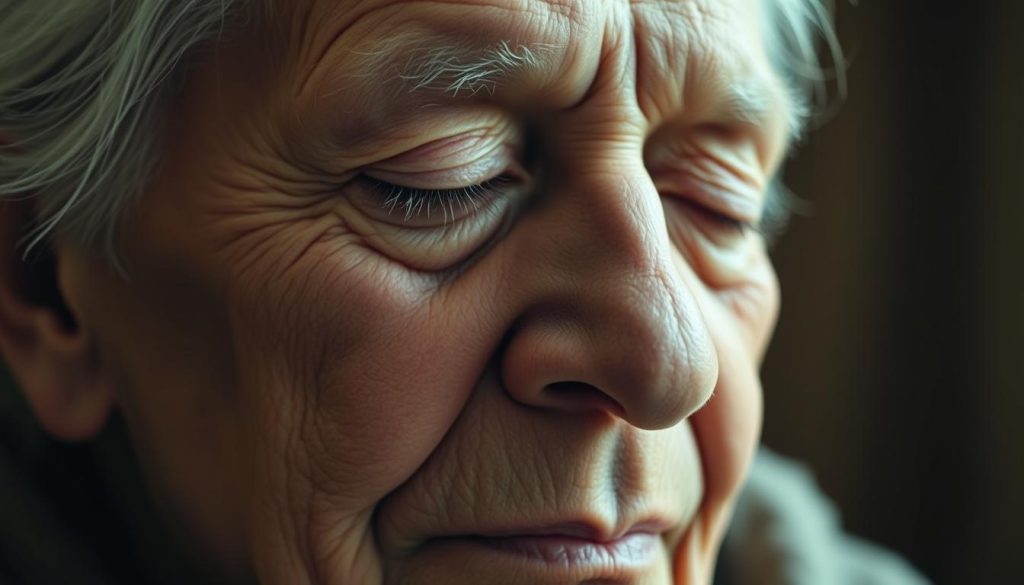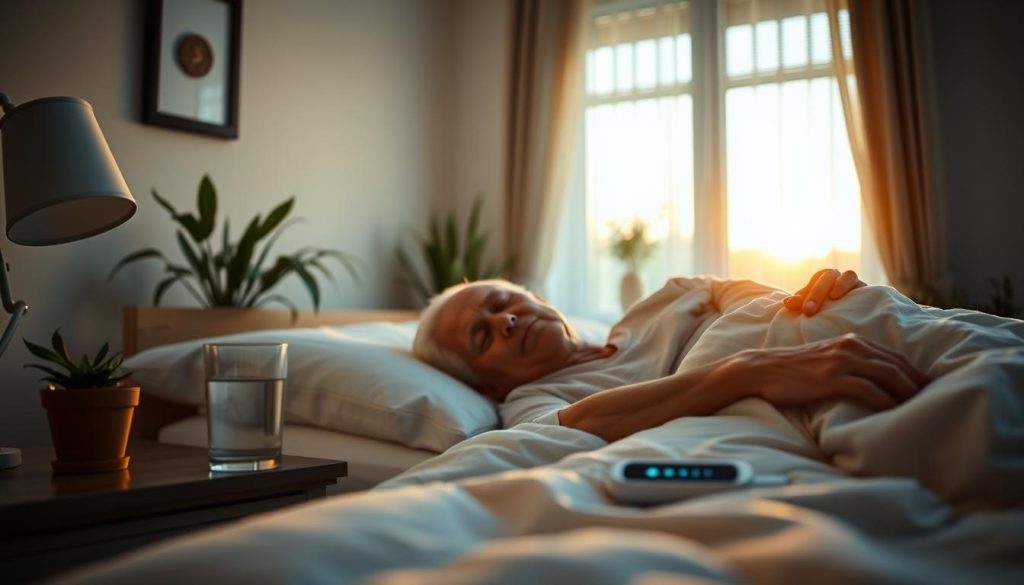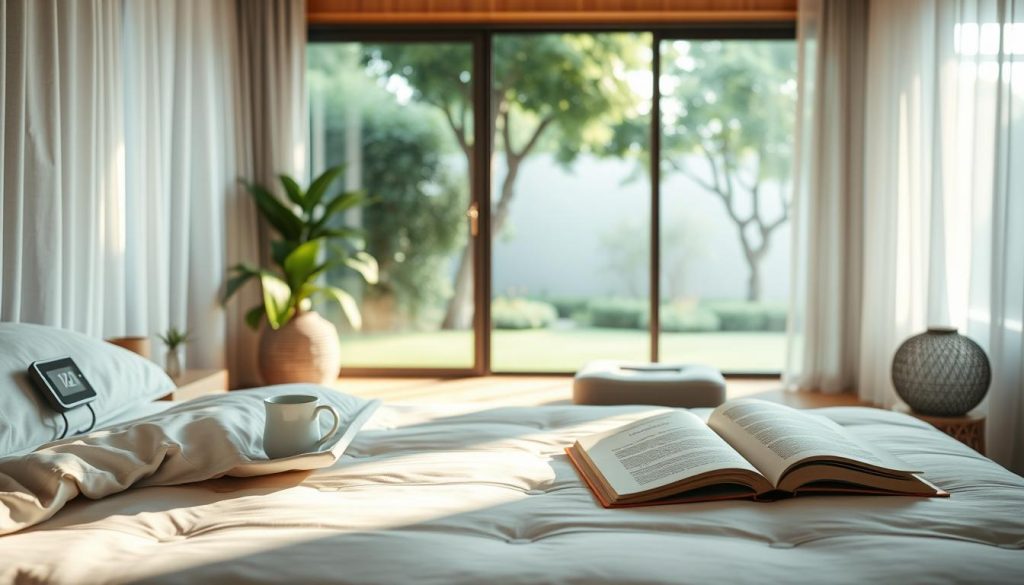As we get older, our bodies change in many ways. One key change is how our internal clock works. This clock tells us when to sleep and wake up. It often changes with age, affecting our health and daily life.
It’s important to understand these changes. Knowing how our circadian rhythm shifts with age helps us sleep better and stay healthy as we age.
In this article, we’ll look at how aging affects our sleep patterns. We’ll see why keeping a healthy circadian rhythm is so important. We’ll also share tips on how to adapt to these changes.
Understanding the Circadian Rhythm
The circadian rhythm is a natural process that controls our sleep and wake cycles. It repeats every 24 hours. It helps our body function well, including our metabolism, hormone levels, and mood.
Knowing about these rhythms is key to understanding their impact on our lives and health. This is especially true as we get older.
Definition of Circadian Rhythm
Circadian rhythms are changes in our body that follow a daily cycle. They mainly respond to light and darkness. These rhythms affect our sleep, eating habits, hormone release, and other important functions.
When these rhythms get disrupted, it can cause health problems. This includes sleep disorders and issues with metabolism.
The Role of the Biological Clock
The biological clock is in the brain’s suprachiasmatic nucleus (SCN). It’s the main timekeeper for our circadian rhythms. It’s located in the hypothalamus and keeps our internal rhythms in sync with the outside world.
It does this by controlling hormone levels and body temperature. This ensures our body systems work at their best. As we age, changes in our circadian rhythms can affect our biological clock. This can lead to changes in sleep patterns and other bodily processes.
How Circadian Rhythm Changes with Age
The circadian rhythm controls our sleep and wake times. It keeps us in sync with our bodies and the world around us. But, as we get older, our rhythm changes. This can cause circadian rhythm disruption in aging, affecting our health and daily life.
Seniors often start sleeping and waking up earlier. This means they might wake up before they want to, leading to poor sleep quality.
Several factors contribute to these changes. Our internal clock weakens with age, making our sleep-wake cycle less stable. Also, living indoors means we get less natural light. This affects our rhythm too.

Knowing how aging affects our circadian rhythm helps us fight its negative impacts. It lets us plan better and improve sleep for seniors. This improves their overall well-being.
Normal Aging and Circadian Rhythm Adjustments
As we age, our bodies naturally adjust our circadian rhythm. This leads to changes in our daily routines and sleep patterns. These changes are a normal part of aging and happen due to various physiological changes.
Shifts in Sleep Patterns
One of the most noticeable changes is the shift in sleep patterns. Older adults often get sleepy earlier and wake up earlier. This is because the body’s internal clock changes with age.
Changes in Hormonal Secretion
Hormonal changes also play a big role in these adjustments. For example, melatonin production, which helps regulate sleep, decreases with age. This can cause fragmented sleep, early morning awakenings, and changes in energy, mood, and metabolism.
The connection between sleep patterns and hormonal changes with age shows how complex aging is. Understanding these changes can help improve sleep quality and overall well-being in later life.
Circadian Rhythm Disruption in the Elderly
Many seniors face problems with their circadian rhythms, leading to sleep issues. As people get older, it’s harder to keep a regular sleep schedule. This can cause problems with thinking, mood, and health.
Things outside of them also affect their sleep. Seniors often get less natural light, especially in places like assisted living. They also miss out on social cues, like regular schedules and family visits.
To fix these problems, we need to tackle them from different angles. We can improve light exposure and encourage social activities. Understanding and fixing the root causes of sleep problems in seniors can greatly improve their health and happiness.
The Impact of Circadian Rhythm on Sleep Quality
As we get older, our body’s natural rhythms change a lot. This affects how well and how long we sleep. These changes can cause sleep problems in seniors, which we need to understand better.
Sleep Fragmentation
Older adults often wake up a lot during the night. This is because their body’s sleep rhythm changes. They also make less melatonin, a hormone that helps us sleep.
This problem makes it hard to sleep well at night. It can also make us tired during the day. It affects our thinking and makes life harder. We need to find ways to help seniors sleep better.
Insomnia and Aging
Insomnia is common in seniors because of changes in their body’s rhythm. It makes it hard to fall or stay asleep. As we age, our body’s clock gets less accurate, making sleep harder.
Dealing with insomnia needs a few steps. We can change our sleep habits, get medical help, and make our sleep space better. Keeping a regular sleep schedule and a quiet sleep area can help a lot.
Strategies to Improve Circadian Rhythm with Age
As we get older, keeping our circadian rhythm healthy is key. A good way to improve senior circadian rhythm is to stick to a regular sleep schedule. Going to bed and waking up at the same time every day helps keep our body’s natural rhythm.
Daytime activities also help our circadian rhythm. Light exercise, socializing, and hobbies tell our body when it’s time to be awake. This helps keep a strong daily routine.
Light therapy is another great tool for sleep strategies for aging. Morning bright light helps reset our internal clock. This makes it easier to sleep at night. But, we should avoid blue light from screens in the evening to keep our rhythm in check.

Creating a sleep-friendly environment is also vital. Keep your bedroom cool, quiet, and dark for better sleep. Comfortable bedding and a supportive mattress can also help.
Eating well and regular meals are important too. Eating foods full of nutrients and avoiding big meals before bed helps sleep. Also, cut down on caffeine and alcohol in the evening to avoid sleep problems.
By using these strategies, seniors can improve their circadian rhythm and overall health. Adding these sleep strategies for aging to daily life can lead to better sleep and a healthier lifestyle.
Research on Age-Related Circadian Rhythm Changes
Research into how our biological clock changes with age has made big discoveries. This section looks at the key findings that help us understand these changes.
Scientific Studies and Findings
Studies over the years show aging affects our body’s internal clock. They found that older adults’ sleep patterns, hormone levels, and sleep quality change. These studies suggest our internal clocks change with age, needing adjustments for health.
| Researchers | Key Findings |
|---|---|
| Charles A. Czeisler et al. | Showed that the amplitude of circadian rhythms diminishes with age, leading to changes in sleep patterns. |
| Josephine Arendt | Highlighted the role of melatonin secretion reduction in older adults, affecting circadian rhythmicity. |
| Russell G. Foster | Explored the genetic basis of circadian changes, linking various genetic markers to aging-related rhythm shifts. |
Future Research Directions
Even with a lot of research, there’s still much to explore. Future studies should look into ways to help older adults adjust to these changes. Using new technology could lead to better treatments for aging-related circadian issues.
Lifestyle Changes to Support Healthy Circadian Rhythm
As we get older, keeping our circadian rhythm healthy is more important. Making a few lifestyle changes can really help. One key thing is to make your bedroom sleep-friendly. It should be dark, cool, and quiet for better sleep.

When and what you eat also matters. Eating regular, balanced meals at the same time each day helps your body’s clock. This keeps your energy and blood sugar stable. Try not to eat big meals close to bedtime to sleep better.
Regular exercise is also crucial. Doing some physical activity during the day helps your body get into a rhythm. It can be a walk, yoga, or lifting weights. Staying active helps keep your circadian rhythm in check as you age.
By making these changes, you can fight off the effects of aging on your circadian rhythm. This leads to a more balanced and healthier life.
The Connection Between Circadian Rhythm and Mental Health
The link between circadian rhythm and mental health is complex. When our internal clocks get out of sync, it can lead to mental health issues. These issues can also mess with our natural body rhythms. It’s key for older adults to understand this, as it affects their overall health.
Impact on Mood Disorders
Changes in the circadian rhythm can harm mood in older people, like depression and anxiety. Research shows that irregular sleep and less daylight can make these symptoms worse. Hormonal imbalances from a misaligned rhythm can also affect mood-regulating neurotransmitters.
Managing Stress and Anxiety
Seniors need to manage stress well to keep their circadian rhythm healthy. Activities like exercise, meditation, and a regular sleep schedule help. A calm, predictable daily routine helps align their rhythms, boosts mental health, and lowers mood disorder risks.
Clinical Approaches to Treat Circadian Rhythm Disorders in Seniors
As more people age, finding good treatments for clinical treatments for circadian disorders is key. These treatments help seniors deal with issues in their body clocks. This is important for their health and happiness.
Medicine plays a big role in treating seniors. Melatonin supplements are often used to help with sleep. They act like the body’s natural sleep signal.
Doctors also use wake-promoting agents. These help seniors stay awake during the day. This way, they can live active and happy lives.
Every senior is different, so treatments must be tailored. Doctors look at each person’s needs and health. This makes sure treatments work well and are safe.
- Melatonin Supplements
- Wake-Promoting Agents
- Personalized Medicine
By using these clinical treatments for circadian disorders, we can make seniors’ lives better. The field of senior circadian therapy is growing. It brings new hope and solutions for those with these disorders.
Personal Experiences: Adjusting to a New Circadian Rhythm as We Age
Aging changes our circadian rhythms, a fact many have experienced. Jane, a retiree from Florida, talks about her journey. She found herself waking up earlier and having trouble sleeping through the night.
Her experiences led her to try new bedtime routines and use morning light. This helped her sleep better.
Robert from California also faced challenges adjusting to new sleep patterns. He used to stay up late but had to start sleeping earlier. He slowly changed his schedule and added a relaxing evening routine with herbal tea and reading.
These changes helped him find a good balance. Their stories show how important being mindful and flexible are for sleep quality as we age.
Mary, an active grandmother in Texas, shares her approach to adapting. She stays active and follows a regular sleep schedule. These habits help her manage her circadian rhythm issues.
By sharing their experiences, these individuals offer valuable advice. Their stories inspire and provide practical tips for those facing similar challenges.

